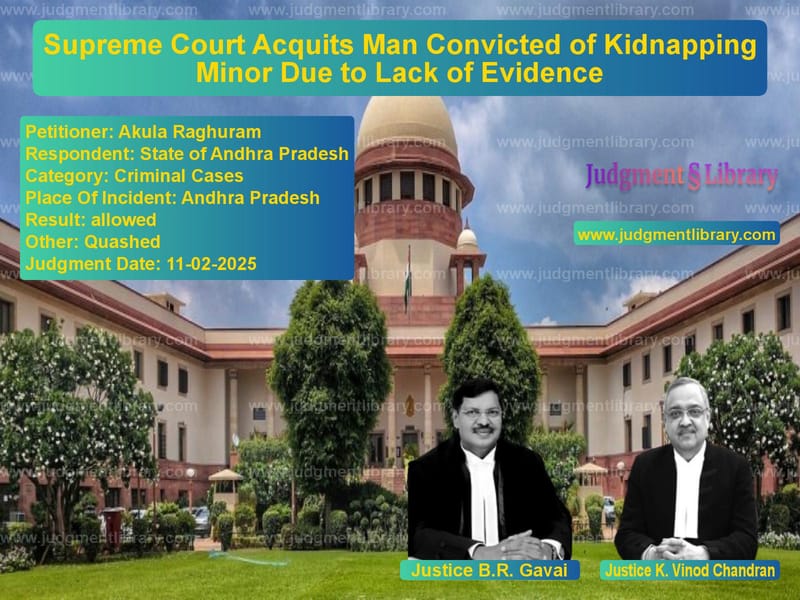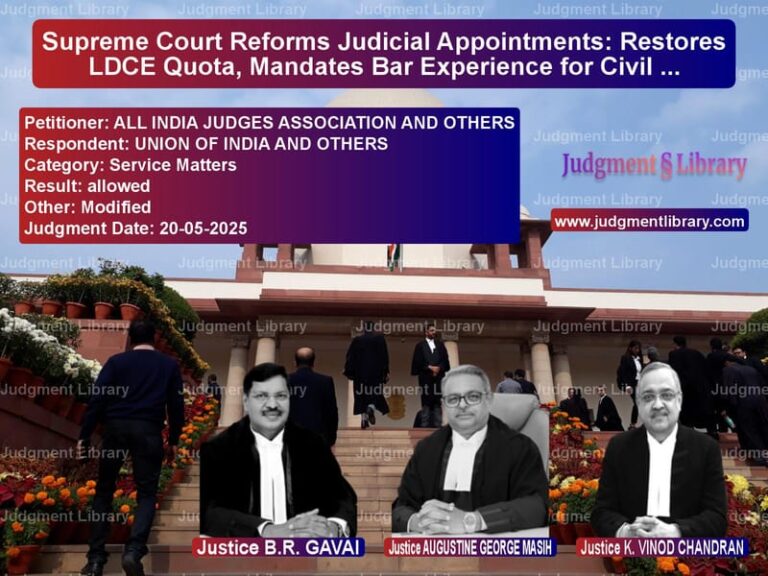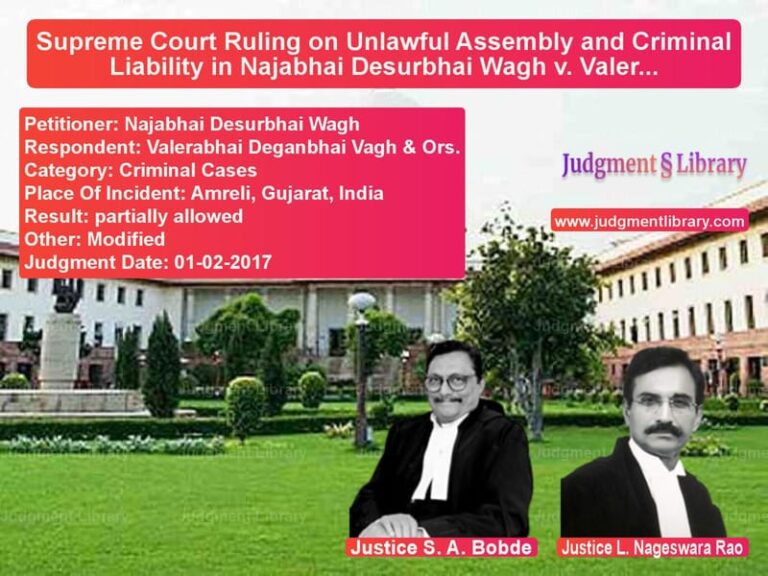Supreme Court Acquits Man Convicted of Kidnapping Minor Due to Lack of Evidence
In a landmark ruling, the Supreme Court of India acquitted Akula Raghuram, who had been convicted under Section 366A of the Indian Penal Code (IPC) for allegedly abducting a minor with the intent of marriage. The judgment overturned the decisions of the Trial Court and the High Court, highlighting inconsistencies in the prosecution’s case and lack of conclusive evidence regarding the victim’s age.
Background of the Case
The case originated from an incident on May 3, 2001, in Andhra Pradesh. The prosecution alleged that the appellant, Akula Raghuram, had kidnapped the victim (PW 7), purportedly a minor, and confined her for over two months with the intention of marrying her. The complainant, the victim’s father, filed an FIR after her return, alleging that the accused had abducted her against her will.
The Trial Court convicted the appellant under Section 366A IPC and sentenced him to imprisonment. The conviction was upheld by the High Court in a criminal revision petition. The appellant then approached the Supreme Court.
Key Legal Issues
- Whether the prosecution established that the victim was a minor at the time of the alleged offense.
- Whether the victim was taken away by force or went voluntarily.
- Whether the testimonies of the victim and witnesses were consistent and credible.
Arguments by the Appellant
The appellant’s counsel argued:
- The conviction was based on inconclusive evidence regarding the victim’s age.
- The victim had willingly traveled with the accused and was never forced into marriage.
- The prosecution failed to produce credible documentary proof of the victim’s date of birth.
- The testimonies of key witnesses, including the victim’s parents and the investigating officer, contained contradictions.
- The forensic examination did not conclusively establish that the victim was a minor.
“The entire case is based on assumptions rather than concrete evidence. The prosecution failed to prove beyond reasonable doubt that the victim was a minor at the time of the incident.”
Arguments by the Respondents
The State of Andhra Pradesh contended:
- The medical report suggested that the victim’s age was between 16 and 17 years.
- The accused had taken the victim away from the lawful custody of her parents.
- Even if the victim had consented, her age made such consent legally irrelevant under Section 366A IPC.
- The victim’s testimony confirmed that she had been taken away against her will.
“The prosecution has provided sufficient evidence that the accused abducted a minor with the intent of marriage, which is punishable under Section 366A IPC.”
Supreme Court’s Observations
The Supreme Court meticulously analyzed the case and found multiple discrepancies:
- The prosecution failed to present a birth certificate or school records to conclusively prove the victim’s age.
- The medical officer’s assessment that the victim was “between 16 and 17 years old” was inconclusive, given the margin of error in ossification tests.
- The victim’s statements were inconsistent—she initially claimed she was taken forcefully but later admitted she did not attempt to escape during the months she was with the accused.
- The investigating officer failed to conduct a proper age verification process.
- There was no allegation or evidence of sexual assault or coercion.
“A conviction under Section 366A IPC requires clear evidence that the victim was a minor and was induced or forced into illicit intercourse or marriage. The prosecution has failed to meet this burden of proof.”
Final Judgment
The Supreme Court ruled:
“The conviction under Section 366A IPC is set aside. The accused is acquitted of all charges, and his bail bonds are canceled.”
The ruling not only overturned the conviction but also emphasized the need for concrete evidence in cases involving allegations of abduction and forced marriage.
Impact of the Judgment
This ruling has significant legal implications:
- Reinforces the principle that convictions cannot be based on vague or inconclusive evidence.
- Emphasizes the necessity of producing credible age-proof documents in cases involving alleged minors.
- Prevents the misuse of laws designed to protect minors from being applied in cases where consent is evident.
- Ensures that courts scrutinize prosecution evidence rigorously before upholding convictions.
By acquitting Akula Raghuram, the Supreme Court has upheld the fundamental legal principle that every accused person is presumed innocent until proven guilty beyond a reasonable doubt.
Petitioner Name: Akula Raghuram.Respondent Name: State of Andhra Pradesh.Judgment By: Justice B.R. Gavai, Justice K. Vinod Chandran.Place Of Incident: Andhra Pradesh.Judgment Date: 11-02-2025.
Don’t miss out on the full details! Download the complete judgment in PDF format below and gain valuable insights instantly!
Download Judgment: akula-raghuram-vs-state-of-andhra-prad-supreme-court-of-india-judgment-dated-11-02-2025.pdf
Directly Download Judgment: Directly download this Judgment
See all petitions in Bail and Anticipatory Bail
See all petitions in Judgment by B R Gavai
See all petitions in Judgment by K. Vinod Chandran
See all petitions in allowed
See all petitions in Quashed
See all petitions in supreme court of India judgments February 2025
See all petitions in 2025 judgments
See all posts in Criminal Cases Category
See all allowed petitions in Criminal Cases Category
See all Dismissed petitions in Criminal Cases Category
See all partially allowed petitions in Criminal Cases Category







